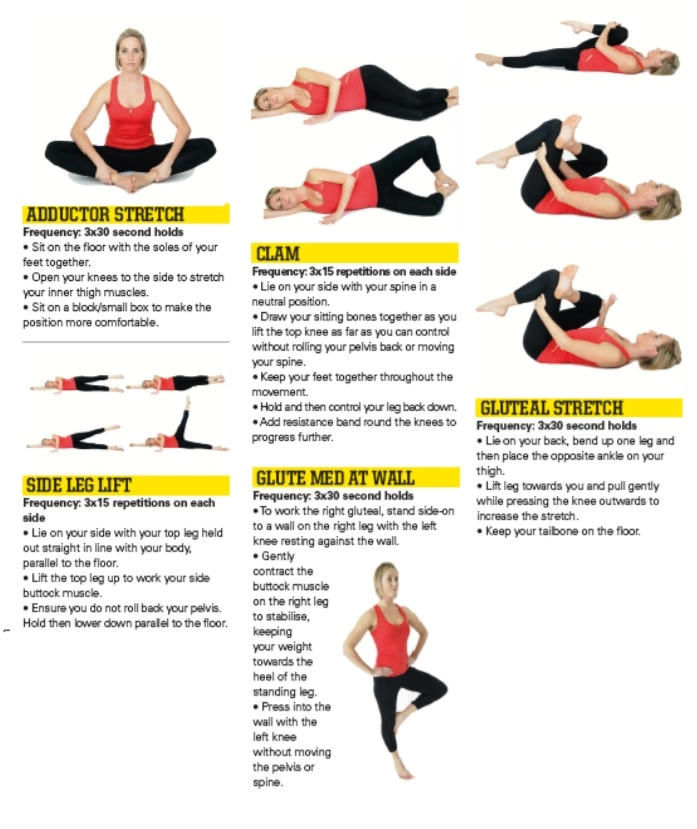Rachel Whittaker has some top advice & exercises for you! TriathlonPlus April 2016, Physio Corner
Gluteal Pain
What is it?
Many conditions can cause pain in the buttocks, commonly known as gluteal pain. Causes of pain in the buttocks range from temporary annoyances, such as bursitis, bruising, piriformis syndrome, muscle strain, and shingles, to more serious diseases with long-term consequences, such as arthritis of the sacroiliac joints, and herniated disc with sciatica. All symptoms related to buttock pain must be evaluated in terms of their severity, intensity, duration, location, and aggravating or relieving factors. For examples, whether or not the pain changes when walking, when sitting, or when at rest while lying down. It is also important to consider the presence or absence of other medical issues in order to precisely identify the cause and to help formulate the optimal treatment for pain in the buttocks.
How do you recognise it?
Gluteal pain can present in many different ways including buttock pain and tenderness, especially while seated or walking up a slope or stairs, deep tenderness in the buttock/hip region, a sharp stabbing pain while seated in a slouched position, pain and pressure in the tailbone or anal region, sacroiliac joint pain or a restriction in hip flexion which feels more like stiffness.
Why do you get it?
A common cause of gluteal pain is piriformis syndrome. The piriformis is a deep gluteal muscle that sits behind the gluteus maximus. The exact causes of piriformis syndrome are unknown however suspected causes include:
- Muscle spasm in the piriformis muscle, either because of irritation in the piriformis muscle itself, or irritation of a nearby structure such as the sacroiliac joint or hip.
- Tightening of the muscle, in response to injury or spasm.
- Swelling of the piriformis muscle, due to injury or spasm.
- Bleeding in the area of the piriformis muscle.
Any one or combination of the above problems can affect the piriformis muscle and may affect the adjacent sciatic nerve which may lead to pain, tingling, or numbness in the back of the thigh, calf, or foot.
Another cause of buttock pain may be Sciatica which is a term used to describe the symptoms of leg pain, tingling, numbness, or weakness that travel down the low back via the sciatic nerve in the back of the leg. Sciatica (sometimes known as radiculopathy) is a description of symptoms, not a diagnosis. A herniated disc, spinal stenosis, degenerative disc disease, and spondylolisthesis can all cause sciatica.
Gluteal tendinopathy is also a very common cause of buttock pain. Your gluteal tendons are the tough fibres that connect your gluteal muscle to your hip bone. A tendon injury may seem to happen suddenly, but usually it is the result of many tiny tears to the tendon that have happened over time which is called a tendinopathy. Tendinopathies tends to be caused by a cumulative microtrauma from repetitive overloading e.g. overtraining.
Bursitis is a condition that can contribute to gluteal pain. A bursa is a fluid sack and its purpose is to reduce friction where muscles pass across other muscles, ligaments or bones. Muscles that are overused or are too tight can rub and inflame a bursa which then causes pain. The two main bursa in the buttock include are the trocanteric bursa and the ischial bursa. One can give you pain on sitting the other pain when lying on your side.
Less common causes of gluteal pain include a sacroiliac joint (the joint where the base f the spine joins the pelvis) dysfunction, stress fractures of the femur, sacrum or pelvis.
What can you do to alleviate it?
It is advised in the first 72 hours of onset of your pain to take some pain killers or non-steroidal anti-inflammatories, along with rest and application of ice which can help alleviate pain. Exercises that you may want to try before seeing a doctor include foam roller release on the buttocks, gluteal and adductor stretches and gluteal strengthening exercises which can be done in the form of mat work and standing exercises. (See illustrations)
If your pain does not settle is advisable to get your gluteal pain assessed by your GP or a health professional such as a Physiotherapist in order to confirm a clear diagnosis which will guide the treatment and management of your pain.

